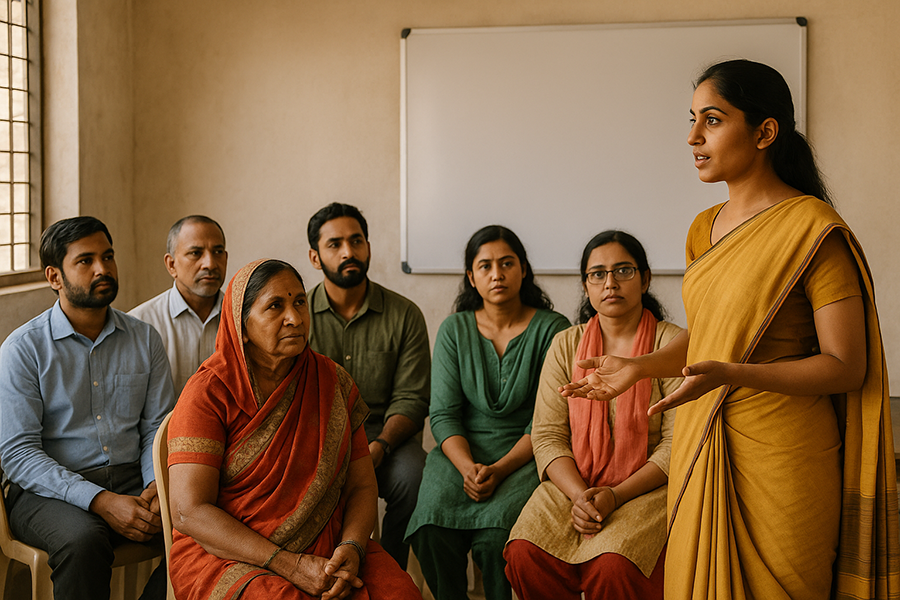This piece talks about the need of the development sector institutions in today’s world and how my journey till now,as a student in this sector,has made me realise that there are many people like me but are unaware of such opportunities.
I am an engineer by accident who always used to observe the inequalities happening around, be it in college life or two years of corporate experience. There always used to be a sense of helplessness within me of not being able to work with the people for overall empowerment. The limited education options after HSC examinations and economic burden of education loan from the engineering led to a life which made no sense to me. My hands were in shackles owing to it. This was one of the reasons which made me complete my engineering and work for two years with hardly in purpose in life.
After two years of corporate life, it was a discerning moment for me where I wanted to live a life which aligns with my values and purpose. It was very clear for me, I have observed tonnes of problems happening around me. If I am able to gain educational expertise in the social sector and channelise my inner potential in addressing at least one of such challengesin a professional way then I’ll be taking one step towards my purpose.
And that’s when an institution like the Indian School of Development Management (ISDM) happened to me. That leap of faith of quitting the job and joining this one-year programme has transformed my life so far. I was fortunate enough tocome to know about such a course from one of my friends. ISDM made this decision simpler by enabling the scholarship and also the employment opportunities college provides after the programme. To be fair, I couldn’t have taken this step if there were no placement opportunities after the programme, as I have to be responsible for my family and self.
My family and friends back home are totally clueless aboutthe existence of such development institutions. I am assertive that there are so many active youth citizenswith concerns about various social issues that are happening in the country and wish to be a part of social change. But our traditional education system has never allowed them to come out of the monotonous purposeless monetary lifecycle. Provided a platform like ISDM where I am able to take a step towards my purpose with a sense of security of my future, our country would see many social change makers in the coming years.
Let me just highlight the safe-space created by the ISDM. The co-founders and the whole team of ISDM consider students as an integral part of the institute. ISDM has created a space where there is no fear of judgement, everyone respects the lived experiences from where the students have come from, and most importantly it constantly reminds me to what values I stand for, helping me to reflect it in daily life. ISDM follows the principle of zero-hierarchy. One example that I can give is of the staff spaces. There are no permanent rooms allocated for staff. If any student wishes to sit in any room and do her/ his own work, has the total liberty to do so and the faculty or the staff may have to sit in any other room. Most of the activities carried out are in groups comprising of diverse backgrounds with respect to age, work experience, gender, education. This has helped me to understand from the dissonance arising out of the multiple perspectives and act from the cognitive coherence by respecting and taking inputs from each perspective.
Adding on, addressing the current scenario, government – the largest social purpose organisation is doing its part to tackle the various challenges the country is facing but that’s not enough. Students graduating out of development institutions can become big change-maker and a catalyst in the development sector, working at a parallel level or with the government. Today, there is a dearth of such development leaders. CSR and social purpose organisations tend to hire people who do not have formal education from the development sector. These organisations need meta-skills which involves advocacy-enquiry, engaging with the community, reasoning and other characteristics along with the technical expertise. Development sector institutions help us in building the necessary meta-skills. Without the meta-skills, one can be a development manager but not the leader.
To conclude, becoming a civil servant is not the only criteria to serve the country. There are several social issues which need to be addressed and the government can’t alone solve these situations. Youth who cares and dream of a just and equitable society can be a part of this change. There are opportunities available and need to be brought in the mainstream at the earliest.
About the Author
Sujith Ail, currently pursuing PGP in Development Leadership at Indian School of Development Management
Sujith worked in a media publishing house for two years and joined ISDM to channelize his intention of working with the communities for overall inclusiveness and equal rights. He was involved in various social activities in school and college where he was an active member of NSS.
Apply for ISDM`s One Year PG Programme in development Leadership.




